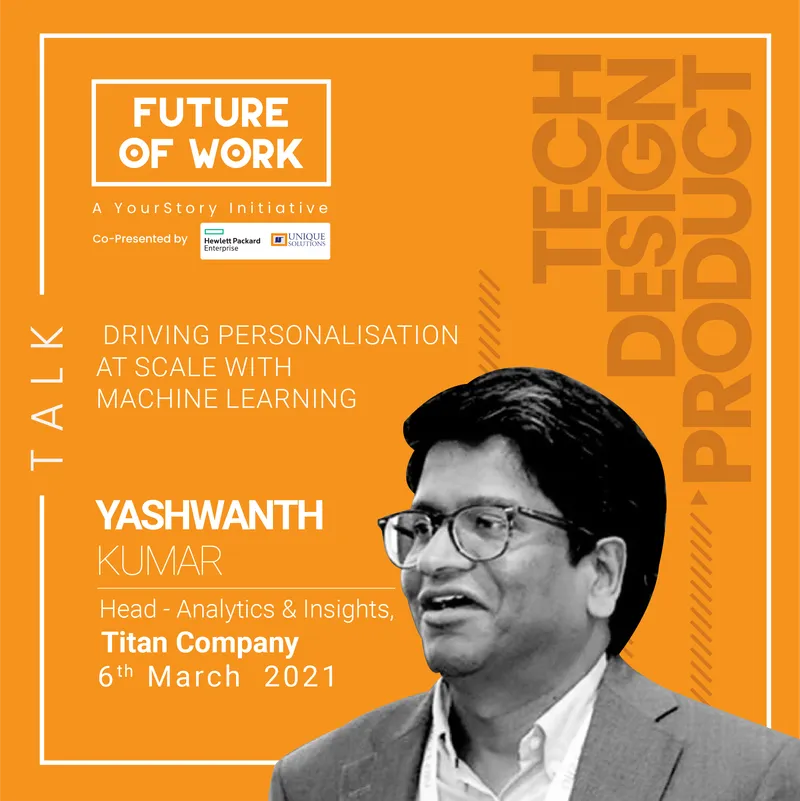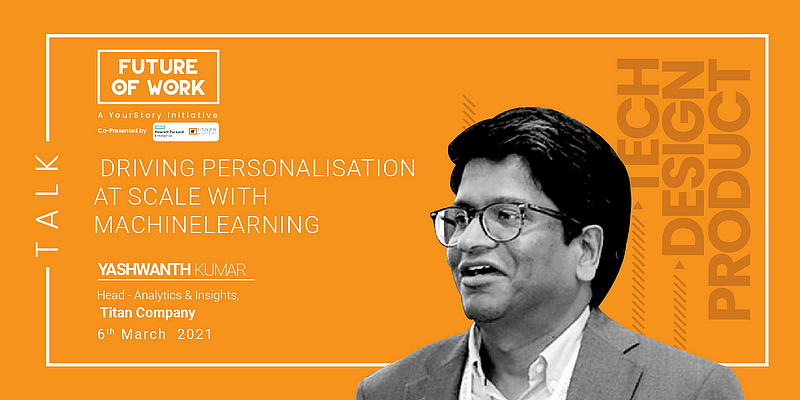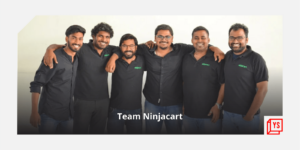Today, customers are bombarded with a deluge of content from multiple brands, at multiple channels, and on multiple platforms. According to an Accenture survey, 91 percent of consumers say they are more likely to shop with brands that provide offers and recommendations that are relevant to them. For marketers to cut through the clutter, they need to be relevant and engage with the customers.
“One of the ways to achieve that is by personalisation,” says Yashwanth Kumar, Head – Analytics and Insights, Titan Company Ltd.

Courtesy: YS Design
On the second day of the fourth edition of YourStory’s Future of Work 2021, Yashwanth spoke about driving personalisation at scale, using Machine Learning (ML).
“Personalisation is the customisation of products or services to meet the specific needs of individuals or groups (segments),” he explained.
In the first segment of the ‘Talk on Driving personalisation at scale with Machine Learning’, Yashwanth spoke about what personalisation means, and why it is relevant in today’s world of digital marketing.
In the second segment, the Head of Analytics and Insights revealed how one can deploy personalisation at scale.
Benefits of personalisation
Personalisation is adopted in marketing, customer experience, retail and ecommerce, he said. It is supposed to drive most of the marketing and CRM metrics, increased campaign engagement and response, driving walk-ins, and getting better user engagement and app retention, among others.
“All your personalisation strategies need to drive business results,” Yashwanth added.
Under marketing, personalisation can look like segmented campaigns, customised messaging and content, personalised offers, and customer specific channels. In the CRM space, the use of loyalty clubs, curated experiences, next best actions, and products are used to provide personalisation. “For well-constructed websites and mobile applications, the landing page is personalised as per one’s needs,” Yashwanth added.

Yashwanth Kumar, Head- Analytics and Insights, Titan Company at the Future of Work 2021
He goes on to back these statements and hypotheses with examples from Titan Company’s brands Titan watches, Skinn, and Tanishq.
“Personalisation has today become the fifth P of marketing — the need to drive relevance and engagement with customers,” Yashwanth explained.
Deploying customisation at scale
Customers today are digitally savvy and on all the time. Thus, marketing and retail engagements need to be real-time. Secondly, customers are omni. That is, they will browse through the apps and visit the stores.
“Your suggestions and recommendations must be consistent across multiple surfaces, and you need to have a technology which supports omni-experience,” Yashwanth said. Thus, to deliver customisation at scale, and across verticals, brands need the following:
Customer 360/MDM/CDP: It helps stitch together a single view of the customer across transactions and interactions. “Data is the foundational element of any analytics. This (Customer 360) essentially gives a single view of the customer,” Yashwanth said.
Typically, a Customer 360 has demographics, capturing transactions across platforms, and interaction across touch points.
Propensity Scores: It is the technology using ML that helps one identify the most profitable and relevant customers.
“Simply put, it is the smart targeting of customers using ML,” he added.
Propensity scores improve the ROI of engagement, as well as reduce customer dissonance.
“You are unlikely to target customers who will not buy your product if you use a propensity score…At Titan we have seen a lift of at least between 10 to 20 percent using propensity scores ,” he said.
ML platform: When a company has multiple brands and multiple customer journeys, in order to orchestrate the management of real-time serving of recommendations at scale, it needs a ML platform to help do that.
Recommendation Systems: To deliver real-time personalisation.
Delivery platforms: These could be campaign tools or CRM applications.
“Personalisation is a combination of art and science. It is not just about creating the customised or personalised product for your customer, but also coming up with a killer creative, building engagement and relevance for the product. The science behind personalisation includes creating a single view of the customer, setting up the technology platform and creating propensity scores and recommendation systems to identify the right customers, at the right time, and for the right product,” Yashwanth said.










![Read more about the article [App Friday] With vlogs, TV shows and movie clips, Cake teaches you to speak English like a pro](https://blog.digitalsevaa.com/wp-content/uploads/2022/02/Image8zkc-1645100407541-300x150.jpg)